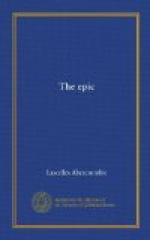But in each case, while the occurrence of regular
epic was seeming so improbable, it nevertheless happened
that poetry was written which was certainly nothing
like epic in form, but which was strongly charged with
a profound pressure of purpose closely akin to epic
purpose; and De Rerum Natura and La Divina
Commedia are very suggestive to speculation now.
Of course, the fact that, in both these cases, regular
epic did eventually occur, must warn us that in artistic
development anything may happen; but it does seem
as if there were a deeper improbability for the occurrence
of regular epic now than in the times just before Virgil
and Tasso—of regular epic, that is, inspired
by some vital import, not simply, like Sigurd the
Volsung, by archaeological import. Lucretius
is a good deal more suggestive than Dante; for Dante’s
form is too exactly suited to his own peculiar genius
and his own peculiar time to be adaptable. But
the method of Lucretius is eminently adaptable.
That amazing image of the sublime mind of Lucretius
is exactly the kind of lofty symbolism that the continuation
of epic purpose now seems to require—a
subjective symbolism. I believe Wordsworth felt
this, when he planned his great symbolic poem, and
partly executed it in The Prelude and The
Excursion: for there, more profoundly than
anywhere out of Milton himself, Milton’s spiritual
legacy is employed. It may be, then, that Lucretius
and Wordsworth will preside over the change from objective
to subjective symbolism which Milton has, perhaps,
made necessary for the continued development of the
epic purpose: after Milton, it seems likely that
there is nothing more to be done with objective epic.
But Hugo’s method, of a connected sequence of
separate poems, instead of one continuous poem, may
come in here. The determination to keep up a
continuous form brought both Lucretius and Wordsworth
at times perilously near to the odious state of didactic
poetry; it was at least responsible for some tedium.
Epic poetry will certainly never be didactic.
What we may imagine—who knows how vainly
imagine?—is, then, a sequence of odes expressing,
in the image of some fortunate and lofty mind, as
much of the spiritual significance which the epic
purpose must continue from Milton, as is possible,
in the style of Lucretius and Wordsworth, for subjective
symbolism. A pregnant experiment towards something
like this has already been seen—in George
Meredith’s magnificent set of Odes in Contribution
to the Song of the French History. The subject
is ostensibly concrete; but France in her agonies
and triumphs has been personified into a superb symbol
of Meredith’s own reading of human fate.
The series builds up a decidedly epic significance,
and its manner is extraordinarily suggestive of a new
epic method. Nevertheless, something more Lucretian
in central imagination, something less bound to concrete
and particular event, seems required for the complete
development of epic purpose.




